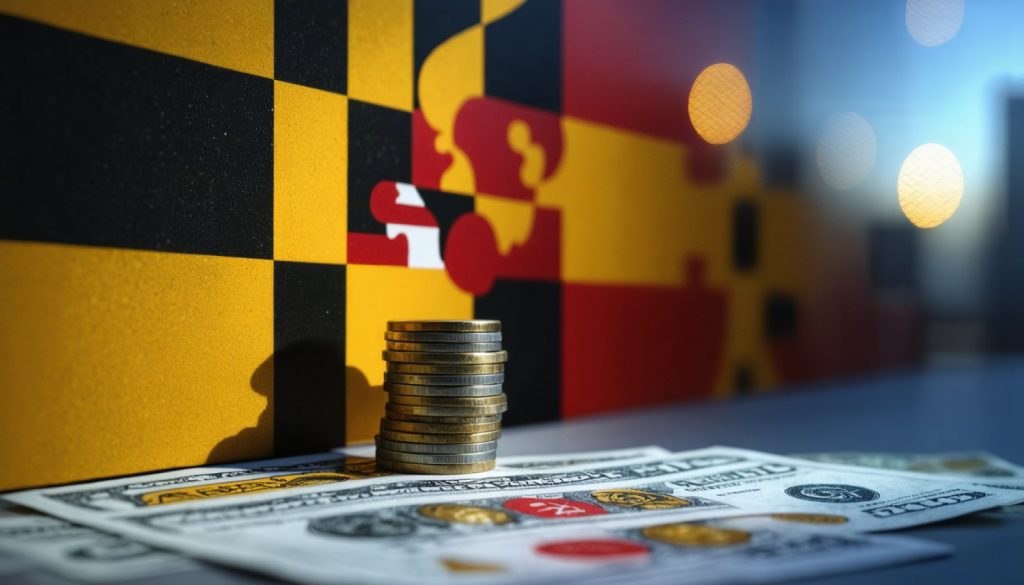
- A proposed 3% sales tax on information technology and digital services in Maryland could prompt a significant departure of tech companies.
- The tax may transform Maryland from an innovation hub to a less viable location for tech startups and small businesses.
- Recent relocations of firms to more business-friendly states, like Virginia and Colorado, highlight Maryland’s potential risk of losing key economic contributors.
- Maryland’s fiscal strategy contrasts with neighboring states that manage lower expenditures while supporting larger populations, suggesting alternative financial approaches.
- States like Texas thrive without corporate or personal income tax, offering a model Maryland might learn from while leveraging its tech industry more effectively.
- The tax’s impact extends beyond finances, potentially resulting in lost opportunities and stifled innovation, threatening Maryland’s economic growth and tech ecosystem.
- Innovative policy measures are crucial to fostering an environment where businesses can thrive and innovation can continue to flourish in Maryland.
Amidst Maryland’s bustling digital landscape, a seemingly innocuous policy proposal looms large—a new 3% sales tax on information technology and digital services. A decision like this, on the surface, might appear as a mere revenue stream for state coffers, but it threatens to mark the start of a grand migration. The very industry that has seamlessly woven itself into every fabric of our lives may find itself at odds with a state it once called home.
Picture this: the rapid hum of innovation that once defined Maryland’s tech scene, a place where startups sprouted like mushrooms after rain, now faces the daunting prospect of a silent exodus. Imagine a technological caravan winding its way to more hospitable terrains in neighboring states. It’s a scene from which Maryland’s future could witness its primary economic engine, technology, grind to an uncertain halt.
The potential implications are stark. Consider small businesses, for whom a 3% rise isn’t merely accounting trivia, but a pivotal factor between expanding their workforce or scaling back operations. For young tech companies with razor-thin margins, this tax might transform Maryland from an incubator of innovation to a desert of deserted ambition. The echoes of recent moves by firms like BigBear.ai and Blackpoint Cyber to Virginia and Colorado, respectively, are telling. They have found fertile ground in regions where business-friendly climates aid their relentless pursuits of technological advancement.
Maryland’s struggles cannot be ignored, yet the path to remedy isn’t found in increased taxation. Pennsylvanian neighbors have managed a delicate dance, sustaining a lower state expenditure while boasting a population more than double, challenging Maryland’s fiscal prudence. Maryland, take note: Texas, often contrasted in discussions about taxation, doesn’t wrest revenue from corporate or personal income—an advantage Maryland cannot match without similar strategies.
Moreover, Texas, buoyed by its immutable energy sector, enjoys a financial stability that grants it the luxury of decision. Maryland, lacking in oil but rich in technology, must recognize the fragility of its prosperity. A tax that hinders its primary economic pillar risks unraveling the diverse tapestry of its tech community.
For companies like Mindgrub Technologies, Maryland is more than a location. It’s home. It’s where relationships flourish, families grow, and businesses intertwine. However, without profound loyalty, new founders, with dreams yet to take root, might easily seek more welcoming shores—where every dollar stretches further, and every innovation isn’t just encouraged, but celebrated.
The true cost of such a tax isn’t merely measured in dollars, but in lost opportunities, uprooted potential, and a stifled future. Maryland policymakers need foresight and restraint. To sustain a thriving economy, they must devise solutions that nurture rather than impede. Only then can Maryland write a future where innovation continues to beckon, and businesses not only survive but thrive.
How Maryland’s Proposed 3% Tech Tax Could Change Its Economic Future
Understanding the Proposed Tax and Its Implications
Maryland’s plan to impose a 3% sales tax on information technology and digital services is stirring significant debate in business and economic circles. While intended as a revenue booster for the state, the tax could have unintended consequences on Maryland’s tech ecosystem and broader economic health.
The Bigger Picture: Context and Impacts
1. Small Business Strain
– Survival at Stake: Small businesses often operate with tight margins. A 3% increase in costs could mean the difference between hiring new talent or downsizing.
– Example Impact: For tech startups, this tax might equate to thousands of dollars redirected from innovation to tax payments, potentially stifling growth or prompting relocation.
2. Tech Exodus
– Recent Relocations: Companies like BigBear.ai and Blackpoint Cyber departing to Virginia and Colorado highlight a worrying trend.
– Potential Scenarios: Neighboring states with more favorable tax environments, such as Virginia and Delaware, become attractive options, potentially decimating Maryland’s tech workforce.
3. Comparative Analysis with Other States
– Pennsylvania’s Model: Successful in managing lower state expenditure; a potential blueprint for Maryland.
– Texas Advantage: No corporate or personal income tax, bolstered by a robust energy sector. Maryland’s challenge is to find a similar competitive edge in a tech-centric economy.
Market Forecasts & Industry Trends
– Tech Industry Migration: If the tax is implemented, analysts predict an outflow of tech companies, leading to decreased investment and innovation in Maryland.
– Regional Competitiveness: States like Virginia, Delaware, and Pennsylvania could see an uptick in tech business registrations as firms flee to avoid the tax.
Controversies & Limitations
– Policy Criticism: Opponents argue it could reduce Maryland’s competitiveness and deter new tech enterprises.
– Unintended Consequences: A crucial consideration is whether short-term revenue gains offset long-term economic damage.
Pressing Questions and Expert Insights
Q1: How will this tax affect Maryland’s long-term economic growth?
– Expert Opinion: Many economists warn that such taxes could deter innovation, resulting in slower economic growth and reduced GDP over time.
Q2: What are the viable alternatives to increase state revenues without harming the tech sector?
– Alternative Approaches: Options include improving fiscal management, exploring public-private partnerships, or incentivizing high-growth industries through grants and subsidies.
Actionable Recommendations
1. Engage with Policymakers: Tech companies should lobby for a reconsideration of the tax, advocating for policies that balance tax revenue needs with economic growth.
2. Explore Incentives: Encourage the state to introduce tax credits or incentives for tech startups and SMEs to foster innovation and sustainability.
3. Diversification Strategies: Maryland should look to diversify its economic foundations, possibly emphasizing renewable energy, biotech, or higher education sectors.
For more insights on Maryland’s economic policies and their impacts, visit the Maryland Government website.
In conclusion, while the intent behind the proposed tax is understandable, it is imperative that policymakers weigh its potential economic impact carefully. Maintaining a robust tech ecosystem is crucial for Maryland’s prosperity, calling for a strategic balance between fiscal responsibility and economic vitality.



